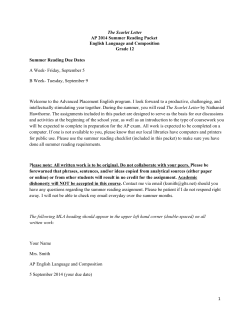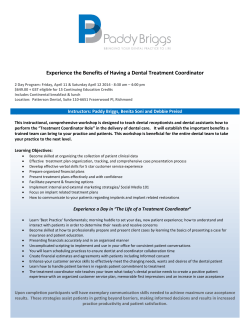
Webinar: How to Start an AP Course ®
Webinar: How to Start an AP® Course Tuesday, Nov. 12, 2013 4 p.m.–5 p.m. EST collegeboard.org/startapcourse Agenda • Administrators • Teachers • Both Why Start an AP® Course? Step One: Choose a Course and Add It to Your Catalog Step Two: Selecting Teachers Step Three: Recruit and Register Students Step Four: Obtain Course Materials Step Five: Complete Course Audit Requirements Step Six: Attend AP Professional Development Step Seven: Launch AP Course Best Practices Questions & Answers collegeboard.org/startapcourse Why Start an AP® Course? Benefits for students » Preparation for success in college and career » Opportunity to receive college credit » Increased likelihood of graduation from college in four years* » College admission opportunities Benefits for schools » Increase college-going culture and college admission » Rich classroom experience » State accountability systems * College Outcomes Comparisons by AP and Non-AP High School Experiences, The College Board, 2008 collegeboard.org/startapcourse Early to Mid Fall Step One: Choose a Course and Add It to Your Catalog How do you go about choosing a course? Review AP Potential™ or other data to identify students who are prepared for college-level courses and exams. » What is AP Potential? » AP Potential demonstration appotential.collegeboard.org collegeboard.org/startapcourse Early to Mid Fall Step One: Choose a Course and Add It to Your Catalog Additional considerations in choosing a course » Alignment with current schedule, accountability framework, class size and graduation requirements » Online AP courses if you cannot offer on-campus courses » Extending access to traditionally underserved minority and/or low-income students » Cost considerations collegeboard.org/startapcourse Mid to Late Fall Step Two: Selecting Teachers How to Select a Teacher Teachers in their own words »Video: Teachers share why they teach AP® classes youtube.com/advancedplacement collegeboard.org/startapcourse Mid to Late Fall Step Two: Selecting Teachers Strategies, Supports, and Resources to Foster Teacher Success » Online Resources for AP® teachers: » » » » Course Home Page via AP Central®: apcentral.collegeboard.org AP Course Audit website: collegeboard.com/html/apcourseaudit/ AP Teacher Community apcommunity.collegeboard.org/ Other ways to support teachers: » » Institute a mentoring program with more experienced teachers or AP Readers Offer networking opportunities with other AP teachers at schools in your area collegeboard.org/startapcourse Late Fall to Late Spring Step Three: Recruit and Register Students Online resources for administrators, counselors, and teachers to expand and enhance AP® participation collegeboard.org/shareap For Administrators & Counselors collegeboard.org/startapcourse For Students For Parents Late Fall to Late Spring Step Three: Recruit and Register Students Best Practice: Ambassadors for AP Program Challenge: Despite the open enrollment policy for AP® classes, teachers at Pflugerville High School (TX) found that underserved students still were not choosing AP courses For details and more best practices, visit “Spotlight on Success Stories”: http://professionals.collegeboard.com/k-12/assessment/ap/equity collegeboard.org/startapcourse Late Spring to Early Summer Step Four: Obtain Course Materials Lists of curriculum resources have been compiled and are available on the AP® course home pages Sample of course materials lists for STEM courses apcentral.collegeboard.org collegeboard.org/ap-stem-accessprogram.html collegeboard.org/startapcourse Late Spring to Late Fall Step Five: Complete Course Audit Requirements What is a course audit? Before you begin you will need: » » College Board School Code (AI Code) College Board Professional Account (EPL Account) Preparing the syllabus » » Administrator role Teacher role What and where to submit collegeboard.com/html/apcourseaudit/ collegeboard.org/startapcourse Summer Step Six: Attend AP® Professional Development Why should teachers attend AP professional development? » AP professional development opportunities » Weeklong AP Summer Institutes » Other workshop opportunities » Online AP Teacher Community apcommunity.collegeboard.org collegeboard.org/startapcourse Late Summer to Early Fall Step Seven: Launch AP® Course Follow these steps if your school has not offered AP courses and exams before » » » Obtain a College Board school code (AI Code) Complete the AP participation survey Identify an AP Coordinator The importance of the AP Coordinator Tips from Derek Kameda, AP Coordinator Harker High School, San Jose, CA » » » » » The role Selecting an AP Coordinator Qualities that make for a great AP Coordinator Work-load expectations How you can support your AP Coordinator collegeboard.org/startapcourse Best Practices From the Field Guest Speaker: Dr. Von Mansfield, Superintendent of Homewood-Flossmoor High School District 233 In Illinois » Homewood-Flossmoor High School District » Challenges in developing an AP Program » www.hfhighschool.org/academics/advancedplacement-program/ collegeboard.org/startapcourse Questions & Answers • Your Questions • What additional resources can we provide? Summary of Useful Links collegeboard.org/startapcourse : How to Start an AP Course apcentral.collegeboard.org : Links to course home pages and hub of information for AP professionals collegeboard.org/appotential; AP Potential collegeboard.org/shareap : Resources to build your AP program apcommunity.collegeboard.org: AP Online Teacher Community collegeboard.com/html/apcourseaudit/ Resources to build your AP Program Twitter.com/AP_Trevor: Follow the head of AP on Twitter for news and updates collegeboard.org/startapcourse Webinar: How to Start an AP® Course Tuesday, Nov. 12, 2013 4 p.m.–5 p.m. EST collegeboard.org/startapcourse
© Copyright 2025













